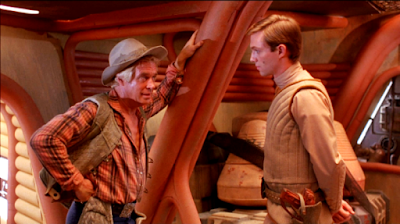 When I was in junior high and high school, this was one of the most recognizable faces in America: Richard Thomas, who played Depression-era teenager John-Boy on The Waltons (1971-77).
When I was in junior high and high school, this was one of the most recognizable faces in America: Richard Thomas, who played Depression-era teenager John-Boy on The Waltons (1971-77).I never saw a single episode, just snippets as I walked through the living room on my way upstairs to watch hip sitcoms like Welcome Back Kotter, Barney Miller or What's Happening!!! Who wanted to watch a boring drama set a thousand years ago, when my parents were kids?
But I saw the parodies on Saturday Night Live and in Mad Magazine, I heard all the jokes, and I had a big crush on Richard Thomas.
Ok, not much of a physique, but that hair, those eyes, those lips! Tell me you can look at that face without wanting to kiss him.
He wasn't a big teen idol, with no shirtless centerfolds in the teen magazines, barely a mention as they poured out articles about Donny Osmond, Leif Garrett, and Shaun Cassidy. Maybe he was too old, in his 20s (born in 1951). Maybe he was too married. Or maybe he just wasn't androgynous.
But I didn't know he was married, and nine years older was the perfect age for me. And the pictures in TV Guide, Parade, and other general-interest magazines were enough to spark my romantic interest.
In an interview, Richard stated that he was studying Mandarin Chinese for fun. I was into languages! Maybe we would meet and study Arabic together.
I like your smile.
Ana uhibu aibtisamatak
May I kiss you?
Hal li 'an 'aqbalak?
The first erotic dream I remember, around 1975 (ninth or tenth grade), involves kissing Richard Thomas. I replayed that dream in my head a thousand times.
I hadn't even figured "it" out yet, and I was fantasizing about kissing Richard Thomas!
During high school and college, I saw him in 3 movies:
1. Roots: The Next Generation (1979). He played a boy involved in an interracial romance.
2. No Other Love (1979). He played a mentally handicapped boy who wants to get married.
Both roles about forbidden love. Could Richard be gay, and trying to "come out" in a roundabout fashion?
3. The 1980 Star Wars rip-off Battle Beyond the Stars (he played Luke Skywalker to George Peppard's Han Solo and Sybill Danning's Princess Leia).
For some reason I missed his role as a gay wheelchair-bound Vietnam vet in Fifth of July. It aired on March 9, 1982, during my senior year in college. Most likely I just didn't know about it.
I haven't seen Richard Thomas in anything since. He generally appears in movies and tv series that I would have absolutely no interest in, religious (The Easter Story, Touched by a Angel), hetero-romantic (Linda, Time after Time), or sad (To Save the Children, Anna's Dream). No more gay roles, that I know of.
Besides, he has not aged well. His eyes have narrowed, his lips have shrunken, his face has panned out. Kissing him would not be out of the question, but it's certainly not the first thing you think of when you see this photograph.
And his photograph was what I fell in love with.
See also: The Waltons: The Gay Connection













